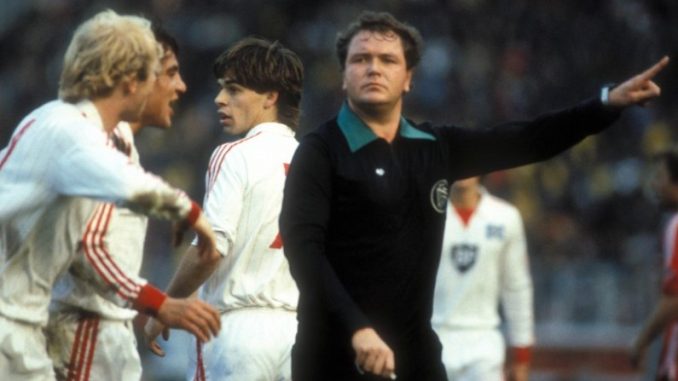
The refereeing in last Friday’s Bundesliga fixture between Bochum and Dortmund has been a hot topic in Germany and worldwide; understandably so, given the impact it could have on the title race. Of course, refereeing mistakes are hardly new – so here are some of the most famous, controversial and significant errors in Bundesliga history.
A helping hand in the relegation playoff
After failing to give Dortmund the penalty on Friday, referee Sascha Stegemann appeared on the Doppelpass talk show on Sunday and apologised for his mistake. This is something he has been through before; in 2017, he was officiating as Wolfsburg met Eintracht Braunschweig in the relegation playoff.
The deciding goal in the first leg came from a penalty Stegemann gave, when a shot from Yunus Malli was blocked by defender Gustav Valsvik’s arm. That handball decision was controversial enough – Valsvik couldn’t really have done anything to get out the way. Worse still, Mario Gómez had clearly controlled the ball with his arm in the buildup. It would be Gómez who stepped up and converted the penalty. The incident led Braunschweig fans to chant, “Mario Gómez ist ein Hurensohn” – Mario Gomez is a son of a whore – in the return leg, which Gómez and his teammates would memorably sing themselves in their post match celebrations.
The goal that never was
Modern Bundesliga fans will remember Stefan Kießling being awarded a goal after his header against Hoffenheim passed through the side netting. The most famous ghost goal in Bundesliga history though will always be the one awarded to Bayern Munich against Nürnberg in April 1994.
Thomas Helmer had ostensibly scored it, but he wasn’t celebrating. Although Helmer himself was in the goal, the ball wasn’t – with an almost open goal, Helmer miscued his shot and deflected the ball wide with the back of his leg on the follow-up. “Everyone in the stadium saw it wasn’t a goal,” Nürnberg keeper Andreas Köpke said afterwards.
Everybody except linesman Jörg Jablonski. Adamant that the ball had gone over the line, Jablonski (father of current Bundesliga ref Sven Jablonski) persuaded the referee Hans-Joachim Osmers (no relation to current Bundesliga ref Harm Osmers) to award Bayern the goal. Only at half-time, Osmers saw the replay, and realised the mistake.
Bayern won 2-1, both goals by Helmer, while Nürnberg missed a penalty late on – given away by Helmer. As the goal had cost Der Club a point, the DFB agreed the game had to be replayed. This time Nürnberg lost 5-0. Four days later, Nürnberg were relegated on goal difference. Köpke maintains they would have stayed up had the goal not been given – and Bayern wouldn’t have been champions.
Oliver Held, Köln’s villain
When 1. FC Köln suffered their first ever Bundesliga relegation in 1998,
Late on, with the scores tied at 0-0, Köln’s Rene Tretschok found himself free in the box with the goal at his mercy. Schalke keeper Jens Lehmann had punched a cross straight to the feet of Tretschok, and the midfielder hit it first time. Lehmann couldn’t stop it, but stood on the goal line, Oliver Held could – and did, with his hand. Punching the ball over with his outstretched arm Suarez-style, it was a blatant red card and penalty.
Referee Uwe Kemmling pointed for a corner instead. Kemmling couldn’t give a handball he hadn’t seen, so went up to Held to ask if he could clear things up. Held told the referee he’d headed it away.
Soon after, Schalke went up the other end and scrambled in a last-minute winner. The 1-0 defeat put Köln in the relegation zone, and they would stay there. Two games later, they were down, finishing two points off safety. A win at Schalke would have made all the difference.
“We are men, and we don’t drink Fanta”
Wolf-Dieter Ahlenfelder refereed in the Bundesliga over 100 times, and was once recognised as the best official in the league. What he’s best remembered for, though, was his performance in only his third Bundesliga game, Bremen vs Hannover in 1975.
When Ahlenfelder arrived at the stadium, he had trouble finding his changing room. At one point he appeared in Bremen’s changing room, where Bremen captain Horst-Dieter Höttges noticed that the referee was clearly drunk. Ahlenfelder had enjoyed a beer and some schnapps with his lunch, and was in no fit state to referee.
He somehow managed to start the game as normal, but blew his whistle only half an hour in, believing it to be half time. Höttges intervened, and convinced Ahlenfelder to continue for a little while longer, and although he did eventually end the first half a minute or two early, nobody seemed to notice. Remarkably, the rest of the game passed without any incident – or any goals.
The DFB would claim that Ahlenfelder had a cold, and his intoxicated state had been caused by a cough syrup that contained alcohol. His explanation was different: “We are men, and we don’t drink Fanta.”
This wasn’t the first incident involving a supposedly inebriated official. In 1969 Bernd Patzke and Petar Radenković of 1860 Munich accused ref Walter Horstmann of being drunk during their loss to Dortmund, Radenković demanding he take a blood test. When Horstmann did, it showed no alcohol, and both players were punished.
Andreas Möller’s dive of the century
In 1995 Dortmund’s Andreas Möller became the first player to ever be retrospectively banned by the DFB for diving, and with good reason. Despite all Möller achieved in his career, his dive against Karlsruhe in April 1995 is still the first thing many think of when they hear his name.
The man who supposedly fouled Möller was Dirk Schuster; in truth he was nowhere near. Möller argued that he had to dive to protect himself from Schuster’s tackle, but the defender’s claim that you could fit a car between the two players was more accurate.
The referee was fooled and gave Dortmund a penalty, which helped BVB come from 1-0 down to win 2-1, keeping them top of the table. Dortmund went on to win the league by a point.
Siegmann & Wiese’s criminal tackles
It’s often described as the most brutal foul in Bundesliga history, yet it was only given a yellow card.
Norbert Siegmann of Bremen famously tackled Bielefeld’s Ewald Lienen so fiercely in August 1981 that it left a deep wound in Lienen’s leg, exposing his muscles and femur. Lienen got up immediately, albeit hobbling, to shout at Bremen coach Otto Rehhagel, who he blamed for Siegmann’s tackle.
Referee Medardus Luca only gave a yellow card, so Lienen had to look for punishment off the pitch. Lienen took legal action against Siegmann and Rehhagel, but nothing came of it.
A similar situation came around in 2008, with a Bremen player involved again. Keeper Tim Wiese booted Hamburg’s Ivica Olic in the face during the Nordderby as Olic ran in on goal. It certainly wasn’t as gruesome as Siegmann’s scissor tackle, but it was as clear a red card as you could ask for. Referee Lutz Wagner inexplicably opted for a yellow instead.
Possibly inspired by Franz Beckenbauer describing the foul as attempted murder, a disgruntled fan in Hamburg filed a criminal complaint against Wiese, which even Olic agreed was unnecessary, as well as pointless.



